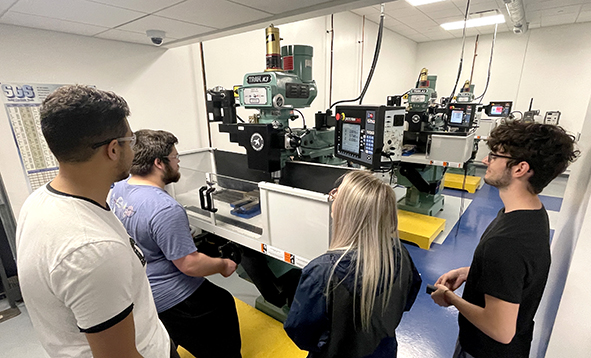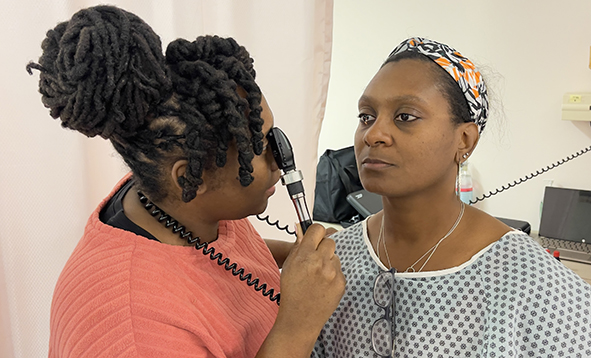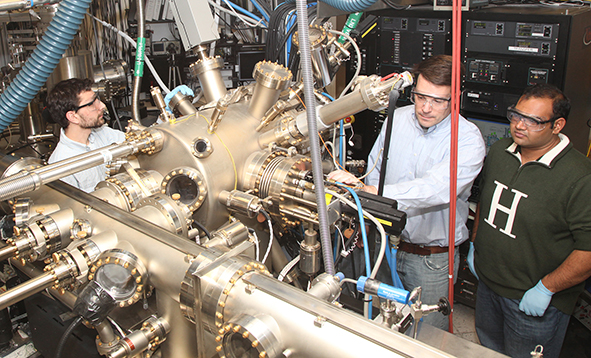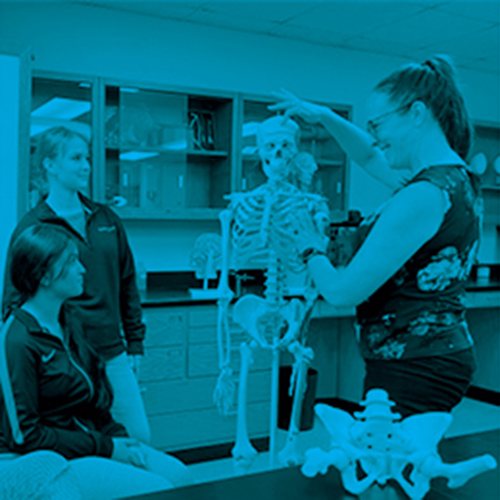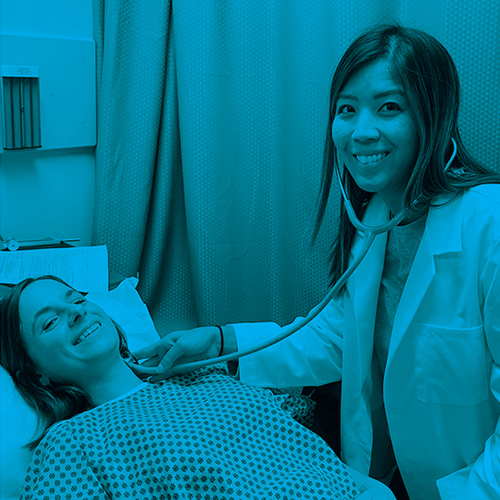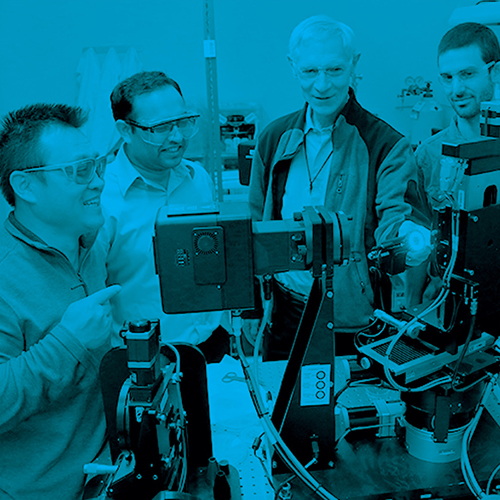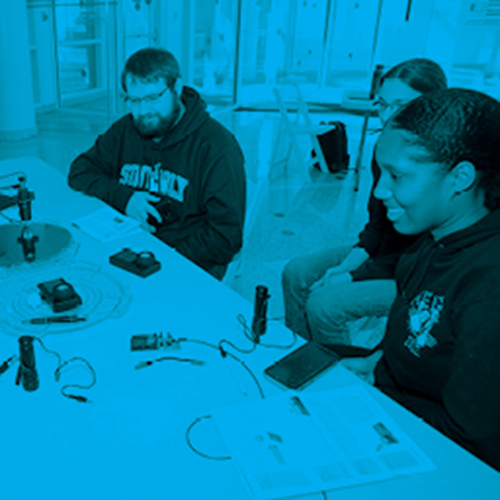Academic Programs Highlights
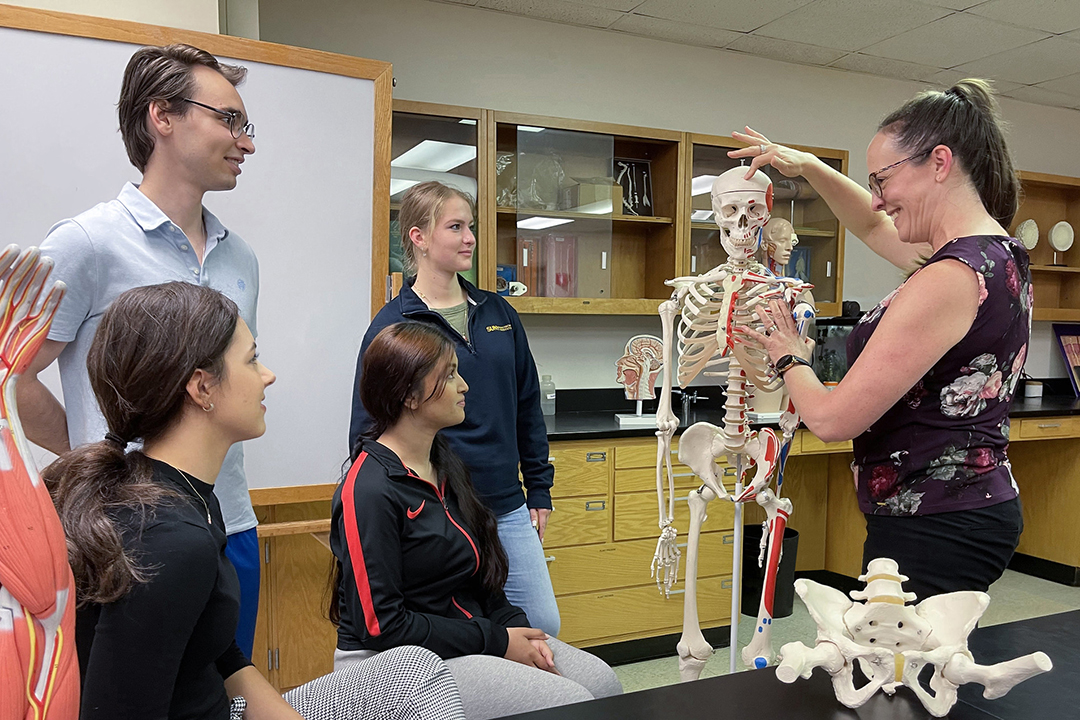
College of Arts + Sciences

What Students and Alumni are Saying About the Newly Named Communications and Media Design Program
SUNY Poly’s newly named Communications and Media Design (CMD) program deals with all aspects of media content creation, including the planning, organizing, writing, and designing of information and communications. Previously known as the Communication and Information Design program (CID), this refreshed program name emphasizes content creation with advanced digital media tools in the fields of interactive media, application and site design, writing and editing, imaging, photography, animation, and video scripting and production. Learn more about the program and what students and alumni are saying about it.
More Than $105,000 in Funding from the National Institute on Aging (NIH) to Better Understand the Aging Process at the Molecular Level
Assistant Professor of Biology Dr. Adam McLain with Assistant Professor Dr. Lauren Endres received more than $105,000 from the National Institute on Aging, a division of the National Institutes of Health (NIH) as part of an overall $439,000 collaborative research effort with University of Minnesota Associate Professor Dr. Christopher Faulk. Spanning SUNY Poly’s Utica and Albany campuses, the research will provide hands-on experience for students as it focuses on understanding genetic aging-related processes across mammalian species, and could eventually lead to the study of famously long-lived organisms such as tortoises and macaws.
Dean Andrew Russell featured in BBC podcast, “The Digital Human”
The BBC podcast, “The Digital Human,” discussed how the Amish evaluate the need for and use of technologies, with the episode featuring SUNY Poly College of Arts & Sciences Dean Andrew Russell. Learn more and obtain the link to listen to the podcast.
Prof. Andrew Gallup Featured on CBS Sunday Morning: ‘The Science of Yawning’
“It’s something we do every day, multiple times, and we often “catch” it from other people doing it. Correspondent Faith Salie looked into the physiology of yawning and why it not only helps our brains, but also is a sign of empathy and, yes, increased alertness.” Read more and view the video.
Professor Andrew Gallup Featured in The Washington Post: ‘Find stress relief with these 7 surprising science-based strategies’
“Research led by Andrew C. Gallup, associate professor of psychology at SUNY Polytechnic Institute, suggests that yawning has a brain-cooling function in vertebrates, including humans. ‘Brain temperature rises during times of stress and anxiety,’ Gallup said. ‘And yawning naturally occurs before and during stressful situations, promoting relaxation and better cognitive functioning. It has nothing to do with boredom.'”
Collaborative research by Prof. Rebecca Weldon published in Memory & Cognition
SUNY Poly Assistant Professor of Cognitive Psychology Dr. Rebecca Weldon recently published, “Stimuli with a positive valence can facilitate cognitive control,” in Memory & Cognition, in collaboration with Dr. Jini Tae from Gwangju Institute of Science and Technology in South Korea; Dr. Yoonhyoung Lee from Yeungnam University in South Korea; and Dr. Myeong-Ho Sohn’s lab from the George Washington University in Washington, DC. Drs. Tae and Weldon and colleagues found that a stimulus typically associated with a positive emotion facilitated cognitive control abilities. In other words, humans tend to perform at an optimal cognitive level when encountering a positive person, object, or event. This research has interesting implications for student learning in the classroom and productivity in the workplace.
Dr. Kazuko Behrens Publishes Special Issue as Editor for “Attachment & Human Development” Journal
SUNY Poly Associate Professor, Coordinator of the Psychology Program, and Chair of the Department of Social & Behavioral Sciences Dr. Kazuko Behrens published a special issue as editor for the high impact journal, Attachment & Human Development. The special issue includes a collection of varied perspectives by leaders in the field of attachment research with regard to the state of the field guided by attachment theory, one of the most influential theories in the developmental science.
Professor Gallup and Undergraduate Sabina Wozny Publish First Study Showing Humans Yawn in Response to Yawns from Other Species
SUNY Poly Associate Professor of Psychology Dr. Andrew Gallup, with undergraduate student Sabina Wozny, found that if you see an animal yawn, the odds are you will yawn in response. Animals 2022 published, “Interspecific Contagious Yawning in Humans,” the first study to formally investigate whether humans yawn in response to yawning stimuli from other species. The study is unique in that yawn-related research typically focuses on contagious yawning between humans to better understand why people might yawn.
Professor Kathryn Stam, Master’s student Kay Klo Recognized as Mohawk Valley Women of Distinction
SUNY Poly Professor of Anthropology Dr. Kathryn Stam and Information Design and Technology master’s student Kay Klo were recognized as Mohawk Valley Women of Distinction for their work with the refugee community and the Midtown Utica Community Center. Individually, the two received citations from New York State Assemblywoman Marianne Buttenschon.
Four SUNY Poly Students Join Masonic Medical Research Institute Summer Fellowship Program
The fellowship is a ten-week program immersing undergraduate, graduate, and medical students in Science, Technology, Engineering, and Math (STEM) projects, providing students the opportunity to engage in cutting-edge research. SUNY Poly students in the program included: Yashi Agarwal, Aaron Farley, Yuriy Milobog, and Catherine Hagearty-Mattern.
Professor Adam McLain Publishes Genomic Research in BMC Genomics
SUNY Poly Assistant Professor of Biology Dr. Adam McLain, with researchers from the University of Minnesota, published genome and epigenome-focused research in BMC Genomics. The mitochondrial genome and epigenome of the golden lion tamarin, an endangered primate found in the coastal forests of Brazil, has been sequenced at a high level of coverage using a novel method. The team extracted DNA from a fecal sample collected from a tamarin named Arie, who is a resident at the Utica Zoo, and sequenced it using a Nanopore sequencing device capable of being powered by a laptop computer.
Collaborative Research by Professor Cafaro Published in Physical Review E
Dr. Carlo Cafaro, applied mathematics assistant professor, collaborated with Dr. Shannon Ray (Postdoctoral Researcher at the AFRL in Rome, NY), and Dr. Paul M. Alsing (Principal Research Physicist at the AFRL in Rome-NY) on a work published in the Physical Review E, the premier American Physical Society (APS) journal in the interrelated areas of statistical, nonlinear, biological, and soft matter physics. The research paper, “Complexity and efficiency of minimum entropy production probability paths from quantum dynamical evolutions,” is a theoretical piece of work that combines elements of quantum physics, statistical physics, and information geometry. The authors propose two simple information geometric measures, one for the concept of “Complexity” and one for the notion of “Efficiency” of quantum-mechanical Hamiltonian evolutions in terms of their corresponding minimum entropy production probability paths.
Professor Ana Jofre publishes simulated facial character development research in Leonardo
In a research article published by Leonardo, Dr. Ana Jofre, Assistant Professor of Creative Arts and Technologies, developed an analytical model that combines facial features from the seven universal facial expressions (joy, sadness, anger, disgust, fear, surprise, contempt) to simulate facial character development. The results show that systematically imprinting emotional features onto a neutral face transforms it into one with distinct character.
Nuclear Physics Publishes Research by Dr. Fariborz and Alumna Mars Lyukova
Mars Lyukova, an alumna of SUNY Poly who graduated in May 2019, collaborated with A. Fariborz during her undergraduate studies at SUNY Poly (Utica campus) which resulted in two publications (the present paper in Nuclear Physics as well as a prior paper published in 2019 in International Journal of Modern Physics https://arxiv.org/abs/1810.10624). The research work that Mars Lyukova collaborated on, together with the upper division physics courses that she took while studying at the Utica campus, as well as her work as a physics teaching assistant, facilitated her admission to the graduate program in physics at Stony Brook in 2019 with teaching and research assistantships.
Prof. Emilio Cobanera featured in Science Daily: ‘Discovery of ‘split’ photon provides a new way to see light’
“Nearly a century after Italian physicist Ettore Majorana laid the groundwork for the discovery that electrons could be divided into halves, researchers predict that split photons may also exist, according to a study from Dartmouth and SUNY Polytechnic Institute researchers.” Read more from the Science Daily article.
Dr. Vijay Ramalingam publishes collaborative chemistry research which could improve natural product drugs synthesis
Many natural product drugs, such as Piperarborenine B (anticancer), incarvillateine (pain killing), and pauferrol A (topoisomerase II inhibitory activity) contain cyclobutane moiety with a specific stereochemistry. The paper, “Unravelling supramolecular photocycloaddition: Cavitand-mediated reactivity of 3-(Aryl)Acrylic acids,” published in the Journal of Photochemistry and Photobiology A: Chemistry by SUNY Poly Assistant Professor of Biology Dr. Vijay Ramalingam, with researchers from the University of Nebraska at Kearney, helps to achieve these cyclobutane rings with a precise stereochemistry using the supramolecular photo-cycloaddition reactions (PCA).
Dean Andrew Russell Publishes Collaborative Research Article in Business History Review
College of Arts and Sciences Dean and Professor of History Dr. Andrew Russell published a collaborative research article that highlights the development of standards for modems, routers, and internetworking. Dr. Russell and his co-authors highlight several individuals who are often overlooked, despite the fact that they played a large role in the growth of the digital economy during its formative years. The article, “The Business of Internetworking: Standards, Start-Ups, and Network Effects,” was published by the Business History Review in a special issue related to standards and international business.
Professor Andrew Gallup, in Partnership with Utrecht University, Published Contagious Yawning Research in Scientific Reports
“People that score high on psychopathic traits show reduced empathy, mimicry, and group cohesion, and as a result may be less susceptible to behavioral contagion,” according to Dr. Gallup. However, previous research in this area has relied on relatively small and homogenous samples of college students. Thus, the team of researchers aimed to further examine this link using a larger and more representative sample. Read more about this research.
Research by Professor Carlo Cafaro published in Physical Review A
The research paper, “Optimal-speed unitary quantum time evolutions and propagation of light with maximal degree of coherence,” is a theoretical piece of work where the authors discover an important link between the propagation of light with maximal degree of coherence and the optimal-speed unitary quantum-mechanical time evolution of a spin-1/2 particle.
In addition, Dr. Cafaro collaborated with Dr. Orlando Luongo (University of Camerino-Italy), Dr. Stefano Mancini (University of Camerino-Italy), and Dr. Hernando Quevedo (Universidad Nacional Autonoma de Mexico-Mexico) on another work that was published in Physica A. The research paper, “Thermodynamic length, geometric efficiency and Legendre invariance,” proposes an intuitive and original geometric measure capable of quantifying deviations from ideality of real gases. This measure is constructed by means of thermodynamic lengths defined within the frameworks of both thermodynamic geometry and geometrothermodynamics.
Professor Gallup’s Collaborative Research Identifies How Disgust of Germs Can Lead to Aversion to Yawning in Others
As societies continue to grapple with the impacts of COVID-19, and now as monkey pox fills headlines, Associate Professor of Psychology Dr. Andrew Gallup has found that, in partnership with researchers from the University of Arkansas, one’s desire to avoid diseases is correlated to their likelihood of avoiding those they see yawning.
Research by Professor Kazuko Behrens and alumnus David Franklin, Jr., published in Youth Voice Journal
Associate Professor, Coordinator of the Psychology Program, and Chair of the Department of Social & Behavioral Sciences Dr. Kazuko Behrens published a paper with SUNY Poly alumnus David W. Franklin, Jr., in the special Issue of Youth Voice Journal. The research, “Attachment Security and Self-Concept in Middle Childhood,” started when Dr. Behrens designed the study with support from SUNY Poly’s Summer Undergraduate Research Program. The study examined the relationship between attachment security and self-concept in middle childhood (N = 78, M = 8.9 years). The findings suggest that an important developmental milestone such as self-concept, a critical component for academic and relational success, can be predicted by attachment security in middle childhood, utilizing multiple user-friendly measures of attachment concurrently, i.e., family drawings and questionnaire-based attachment scales.
Professor Andrew Gallup featured in Science: ‘Why yawns are contagious—in all kinds of animals’
“Yawning probably arose with the evolution of jawed fishes 400 million or so years ago, says Andrew Gallup, an evolutionary biologist…who has spent years trying to figure out why we yawn. In a paper published this month in Animal Behavior, he reports some evidence for how contagious yawns might have evolved to keep us safe. Science chatted with Gallup about why yawning is ubiquitous—and useful; read more here and here.
Research by Dr. Cafaro published in ‘Mathematics’
Dr. Carlo Cafaro collaborated with Dr. Domenico Felice (SUNY Poly Visiting Scientist and former Postdoctoral Researcher at the Max Planck Institute for Mathematics in the Sciences in Leipzig-Germany) on a work published in Mathematics. The research paper, “Explicit Information Geometric Calculations of the Canonical Divergence of a Curve,” is a formal proof-oriented mathematical work with a clear pedagogical flavor for the information geometry community. Read more about the paper.
Professor Gallup’s Collaborative Research on ‘Winning Streaks’ Published in Journal of Ethology
Associate Professor of Psychology Dr. Andrew Gallup’s collaborative research with Nova Southeastern University was published in the Journal of Ethology. The research paper, “Carpe diem: winner and loser effects are constrained to same-day competitions in collegiate baseball,” highlights the team’s findings after they assessed, “the functional persistence of winner and loser effects in college baseball by investigating outcomes (splits vs. sweeps) of multi-game series played over one or more days. “Results show that sweeps occur at disproportionately higher frequencies in single-day series, but drop off to expected levels for multiday series.”
Research by Dr. Carlo Cafaro published in Physica Scripta
Dr. Carlo Cafaro also published a work in Physica Scripta: “Geometric Graph-Theoretic Aspects of Quantum Stabilizer Codes.” In the research paper, Dr. Cafaro proposes a systematic procedure for the construction of graphs associated with binary quantum stabilizer codes. The scheme serves to verify the effectiveness of binary quantum stabilizer codes in graph-theoretic terms. Graphs are visual aids that provide geometric intuition which, in turn, helps to mitigate the tedium involved in checking detectability and correctability conditions for errors occurring in quantum computational tasks.
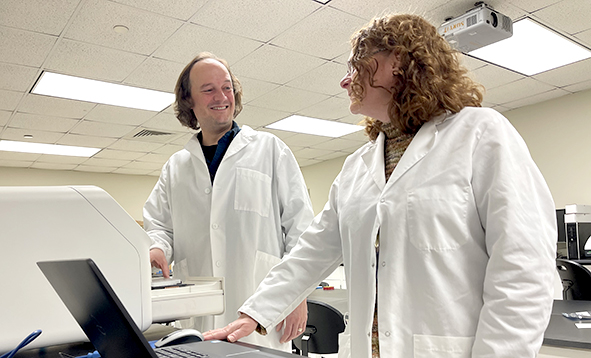
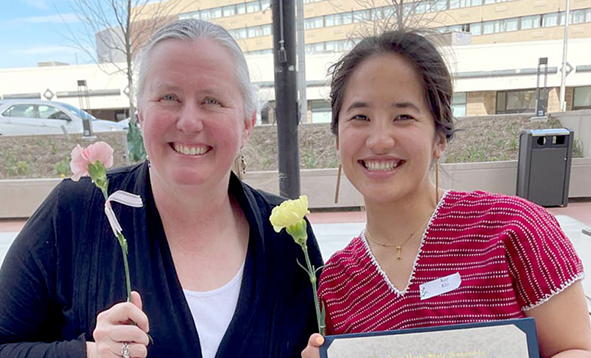
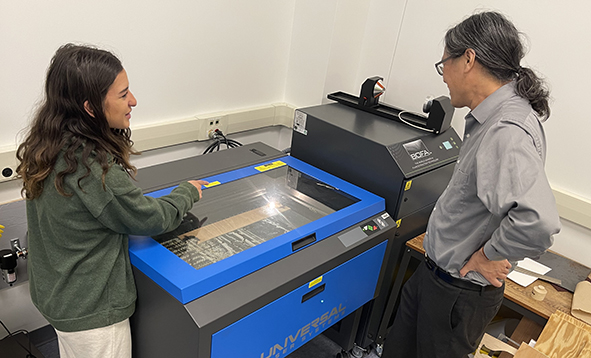
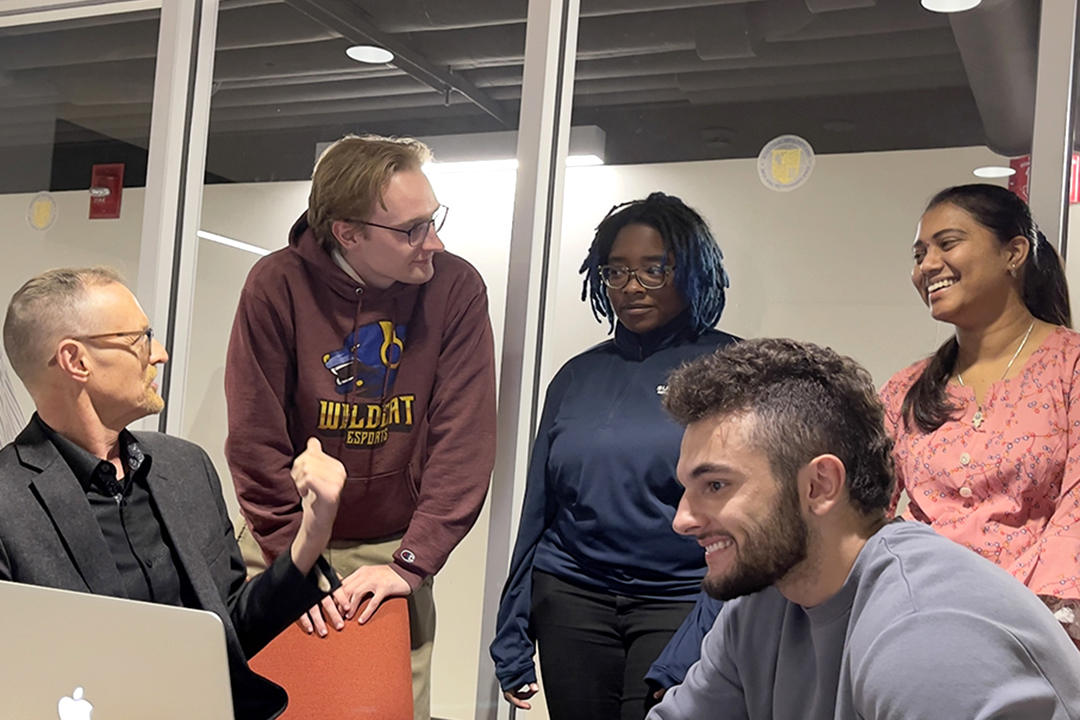
College of Business

SUNY Poly Offers New Online Bachelor of Science in Finance Program
SUNY Poly’s College of Business introduced a new, 100-percent online Bachelor of Science (B.S.) in Finance degree program, complementing the in-person B.S. in Finance program that SUNY Poly currently offers. The new online format, approved by SUNY and the New York State Education Department, prepares students with critical skills and employs the latest financial technologies. Students will be able to succeed in the finance world as they earn a degree at their own pace. Applications were being accepted for Spring 2022.
SUNY Poly Named to Fortune’s 2022 List of Top Rated Online MBA Programs
The College of Business is thrilled to be recognized for academic excellence after being named to Fortune’s 2022 list of top rated online MBA programs. The ranking, in which SUNY Poly was listed as #27 in the nation, moving up from #71 in 2021, is made up of four components: Program Score, Fortune 1000 Score, Brand Score, and Prestige Score. Explore the rankings and be sure to share the good news.
SUNY Poly Names 10 Teams Advancing in Annual New York State Business Plan Competition
SUNY Poly announced ten teams of students emerged as regional finalists following the conclusion of the Mohawk Valley regional semifinal of the New York Business Plan Competition, hosted by SUNY Poly. Among the finalists who advanced to the finals of the statewide New York Business Plan Competition were nine SUNY Poly student-led teams, as well as one team featuring SUNY Poly and Adelphi University students that pitched plans related to the tracks listed here.
- At the state-level grand finale held in Syracuse on April 27, two of the above ten semifinalist teams won special prizes:
- The KeyBank Healthcare Founder–awarded to an under-represented founder in the healthcare space; presented to Maternal Health Monitoring Service from Adelphi University and SUNY Poly, a nonprofit remote maternal health monitoring service for pregnant & postpartum black women.
- The Genius NY Prize–presented to a founder leveraging drones, autonomous systems, robotics and/or big data in their business model; went to Small Farm Automation from SUNY Poly. To help small farmers maximize their limited time, effort, and resources, the company provides automation solutions to clients allowing them to survey their operations to gather data and detect issues before they evolve into large problems.
Dr. Robert Edgell Presents at Virtual 81st Annual Meeting of the Academy of Management
Dr. Edgell, coauthor of, “Institutionalizing Outer Space: A sociotechnical explication of the Comsat-Intelsat actor-network,” presented his research at the virtual 81st Annual Meeting of the Academy of Management.
Dr. Marie-Odile Richard Publishes Several Research Articles Related to Purchases, Advertising
Dr. Richard was a coauthor of, “An investigation into online atmospherics: The effect of animated images on emotions, cognition, and purchase intentions,” published by the Journal of Retailing and Consumer Services. In addition, she coauthored, “More than a mere cup of coffee: When perceived luxuriousness triggers Chinese customers’ perceptions of quality and self-congruity,” published in the Journal of Retailing and Consumer Services, as well as “What is this accent? Effects of accent and language in international advertising contexts,” published by the International Journal of Consumer Studies.
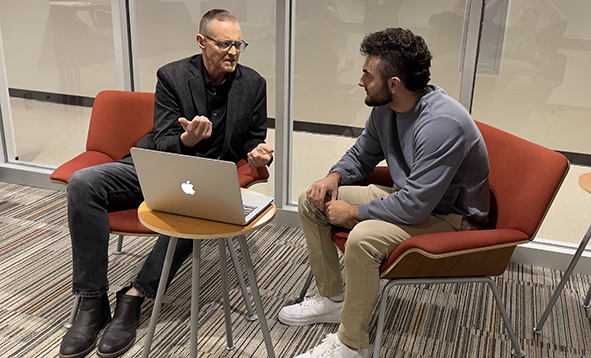
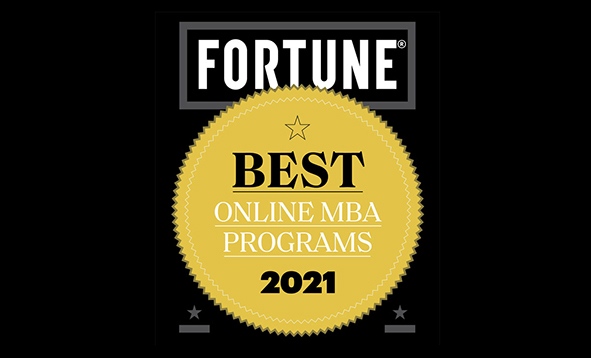
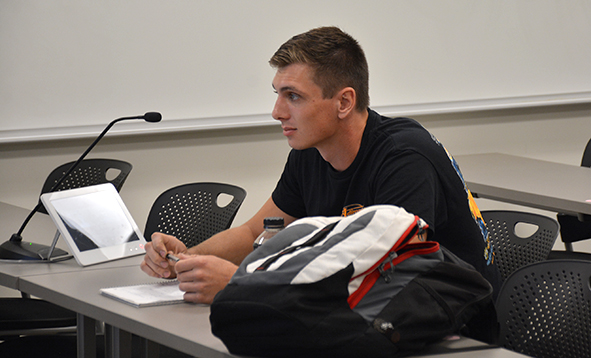
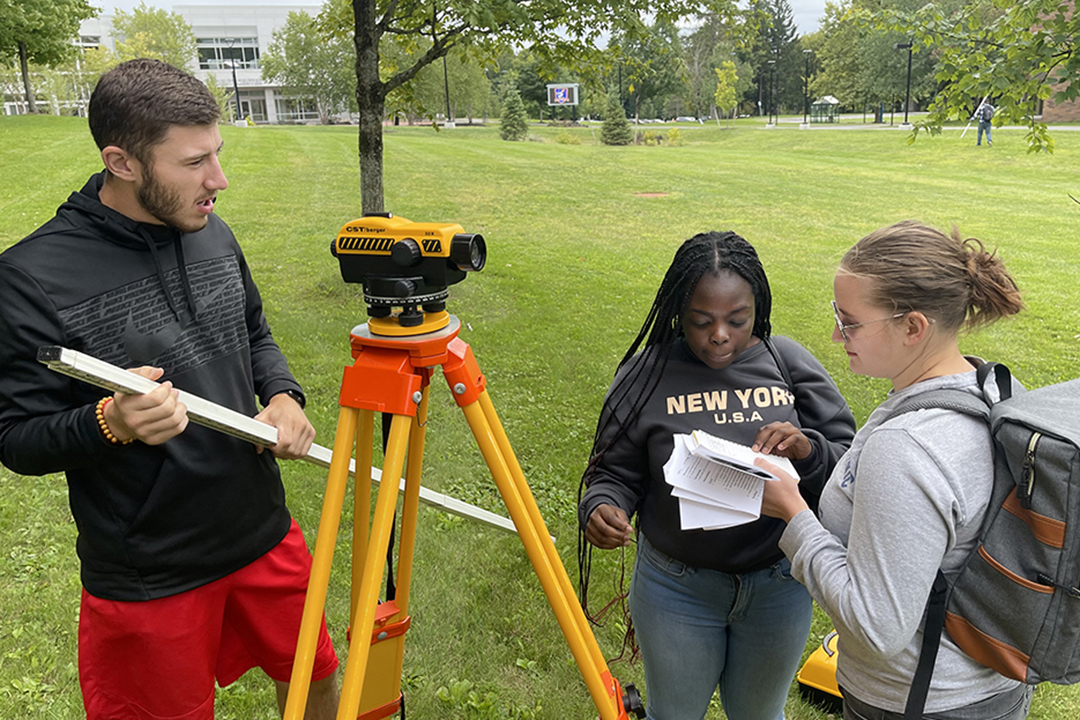
College of Engineering

Newsweek, Make: Select SUNY Poly as One of the “Best Maker Schools 2021”
SUNY Poly has been recognized by Make: and Newsweek, after the publications received nominations from a “unique global community of makers, educators, and Maker Faire leaders, who highlight top schools for turning concepts into game-changing reality. Read more about this selection.
Nearly $200,000 in Funding from NSF for Better Modeling of Rocking Foundations to Improve Structural Resiliency During Earthquakes
Associate Professor of Civil Engineering Dr. Sivapalan Gajan received $198,000 in funding from the National Science Foundation (NSF award number 2138631). The research combines physics with data science, leveraging computational modeling, simulations, and machine learning capabilities to develop a greater predictive framework to enable engineers to design more effective rocking systems for foundations to improve the resiliency of buildings and bridges in order to reduce human and economic losses resulting from earthquakes.
Mohawk River water contamination research led by Professor Carolyn Rodak published in ‘Water’
Dr. Carolyn Rodak, Associate Professor of Civil Engineering, with research assistant Michael Ormanoski and University at Albany research assistant Kyle J. Lininger, published, “Observations and Correlations from a 3-Year Study of Fecal Indicator Bacteria in the Mohawk River in Upstate NY,” in Water. The research used the detection of fecal indicator bacteria (FIB) as a way to explore the impact of combined sewer overflows (CSOs) on local water quality.
Drs. Yu Zhou, Hisham Kholidy, Among Professors Participating in AFRL’s 2022 Visiting Faculty Program
Dr. Yu Zhou, Associate Professor of Mechanical Engineering, participated in the 2022 Visiting Faculty Research Program funded by Air Force Research Laboratory during the summer of 2022. He carried out research on developing an optimization approach to determine the optimal deployment of UAVs for providing persistent surveillance coverage for ground vehicle navigation.
Dr. Kholidy’s visiting faculty program project aims at developing a zero-trust security framework for the new 5G open architecture that eliminates implicit trust and continuously validating every stage of a digital interaction between the architecture entities. The current security practices are proven to be ineffective to address the cybersecurity challenges of this new architecture and none of the current state-of-the-art solutions introduces a real-time solution to address these challenges. Two students are funded by this project (one of them from SUNY Poly), and the team submitted a research paper with AFRL collaborators that lists the project outputs to the IEEE 40th Military Communication Conference (MILCOM).
College of Engineering Student Team Ranks 2nd in International Hackfest
From May to June 2022, a team of SUNY Poly students, including one student who attends the University at Buffalo, discovered the real-world value of SUNY Poly’s hands-on education. The team, led by Assistant Professor and Director of the institution’s Advanced Cybersecurity Research Laboratory (ACRL) Dr. Hisham Kholidy, immersed themselves in the ACRL’s 5G tools, applying what they learned from participating in cybersecurity experiments to specific challenges at the Open Source MANO (OSM) International Hackfest where they finished in second place.
Mechanical Engineering Student Team Wins 2nd Place in Annual 2022 CREATE Program to Help Those with Disabilities Succeed
The main focus of the SUNY Poly/Arc Oneida-Lewis Slate Cleaning and Packaging Project is to improve the system currently in place to wash and package slate used to make cutting boards that come to them from a local quarry. The project aims to improve how employees with disabilities move the heavy slate from one station to the other as well as transport heavy buckets of cleaning liquid used to wash the slate.
AISI Standards Council: SUNY Poly Announced as a Winning 2022 Small Project Fellowship Program
The American Iron and Steel Institute (AISI) Standards Council selected four winning research proposals for its 2022 Small Project/Fellowship Program, including “Guidelines for Member-Level Analysis-Based Testing,” led by Dr. Zhanjie Li, Associate Professor of Civil Engineering. Validated high-fidelity computational modeling provides a reliable prediction of structural behaviors and saves significant costs when compared with full-scale experimental tests. This research will provide the necessary background work to pave the way for possible codification of testing by analysis in the AISI standards, making it easier for members of AISI’s standards development committees to advance a direct analysis of cold-formed steel members and explore an analysis-based test approach.
Abbas Kazan, SUNY Poly ’19, selected as ASCE “2022 New Faces of Civil Engineering” for helping home communities near and far
Abbas Kazan loves the upstate New York region he’s called home for nearly eight years. But on Aug. 4, 2020, when an explosion struck the Port of Beirut, it was suddenly very difficult to be 6,000 miles away from the place where he grew up. That’s when he decided to give back to his current home—and the home he remembers. Read More and View Video.
FGI Welcomes SUNY Poly’s College of Engineering
The Fabricated Geomembrane Institute (FGI) welcomed its newest Government/Regulatory Agency Member, SUNY Poly’s College of Engineering; read the FGI news release.
Professor Zhanjie Li’s Collaborative Engineering Research Published in Structural Engineering
Structural Engineering published Associate Professor of Engineering Dr. Zhanjie Li’s collaborative research, “Fire Resistance Numerical Simulation of Extended End-Plate Steel Connection Joints with Different Strengthening Strategies under Fire.” The research aims to “investigate the bolted end-plate beam to column (BEBC) joints with different strengthening strategies under fire through a parametric study by using a validated computational model.”
Professor Hisham Kholidy’s 5G Security Research Published in Sensors’ Special Issue
Assistant Professor Dr. Hisham Kholidy’s research paper, “Multi-Layer Attack Graph Analysis in the 5G Edge Network Using a Dynamic Hexagonal Fuzzy Method,” was published by Sensors in its special issue: Experimentation in 5G and beyond Networks: State of the Art and the Way Forward. “This paper studies the vulnerability assessment in the 5G networks and develops an optimized dynamic method that integrates the Technique for Order of Preference by Similarity to Ideal Solution (TOPSIS) with the hexagonal fuzzy numbers to accurately analyze the vulnerabilities in 5G networks.”
Dr. Jagannath Upadhyay, LA DOTD, LSU Collaborate in Canadian Journal of Civil Engineering
Assistant Professor of the College of Engineering Dr. Jagannath (Jay) Upadhyay collaborated with the Louisiana Transportation Research Center (LTRC), Louisiana Department of Transportation and Development (LaDOTD), and LSU for a publication entitled, “Classification of Surface Pavement Cracks as Top-down, Bottom-up, and Cement-Treated Reflective Cracking Based on Deep Learning Methods.”
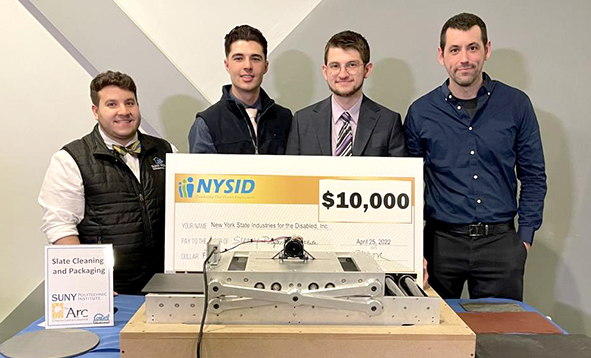
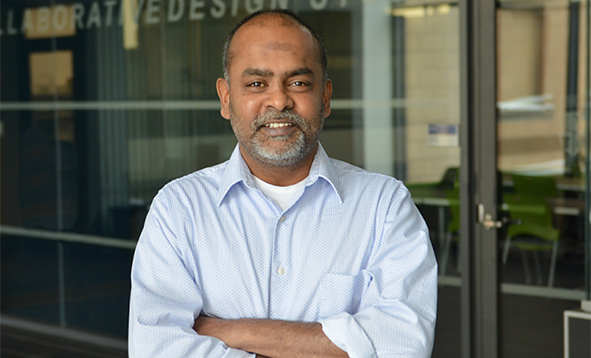
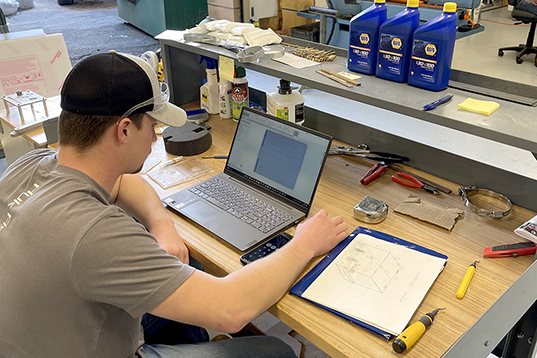
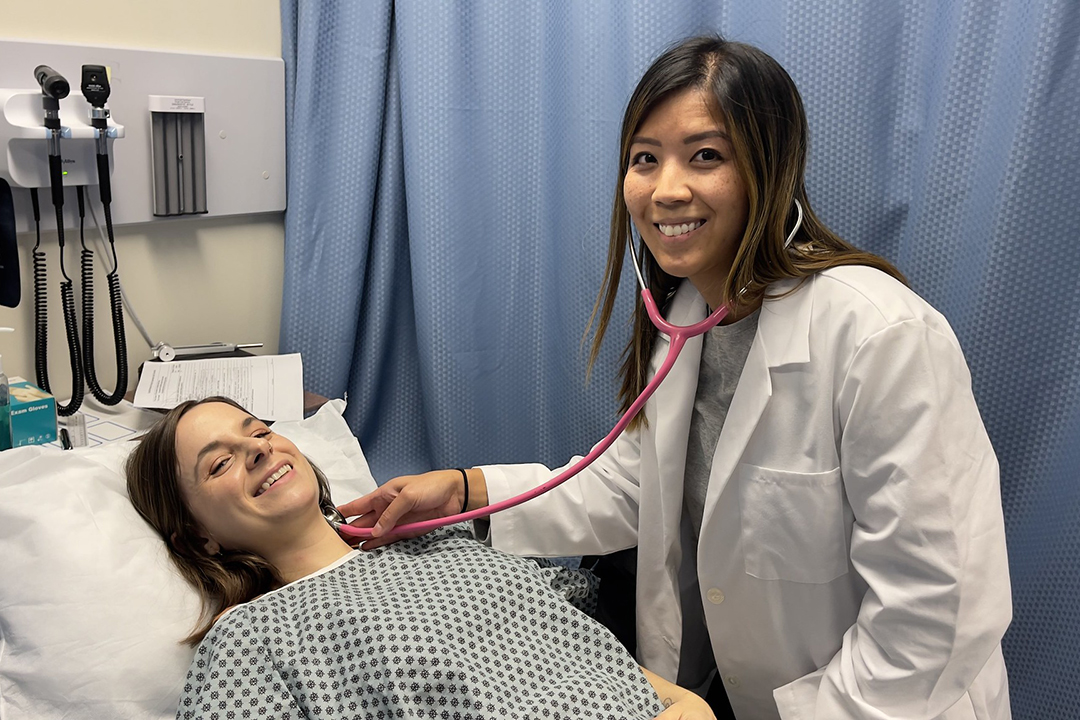
College of Health Sciences

SUNY Poly Ranked in Top 20 Best Online MSN Nurse Educator Degrees 2022 in the Nation by ‘TopRNtoBSN’
According to TopRNtoBSN: “Students can complete one of the best online MSN Nurse Educator degree programs at SUNY Polytechnic Institute with thirty-nine credits. Attending full-time, students can complete the program in four semesters. Part-time students usually take six semesters to finish. Graduates go on to careers in nursing education or staff development. Many students find careers as administrative leaders or faculty members in two-year or four-year nursing programs. Some graduates go on to obtain their doctorate after completing this degree.”
Strategic Partnership for SUNY Poly and SUNY Jefferson Receives $250,000 SUNY Award to Expand Campus Healthcare Programs Enrollment for In-Demand Nursing Workforce Needs
Each institution received $125,000 in funding from SUNY as part of an overall $250,000 award to strengthen the registered nursing (RN) pipeline, improve graduate retention rates in the RN and BSN (Bachelor of Science in Nursing) programs, and develop a seamless pathway for RNs to pursue BSN, MSN (Master of Science in Nursing), and DNP (Doctor of Nursing Practice) programs at SUNY Poly.
Four Entities Form Partnership under Little Falls Connected Community Schools
Little Falls CSD School Superintendent, Dr. Keith Levatino, Connected Community School’s Co-Leader Danielle Martin, SUNY Poly Interim Dean of the College of Health Sciences Dr. Joanne Joseph, and Daneli Partners Chief Executive Officer, David Casullo, announced recent development of a formal partnership between the 4 entities to enhance the resiliency of students and families under the Connected umbrella. This partnership will not only provide the students of Little Falls an opportunity to enhance their individual social and emotional learning, but it will also provide hands-on experience with civic responsibility and exposure to higher education. It will also provide SUNY Poly students with an opportunity to research and further explore their career interests.
New St. Elizabeth’s Initiative Could Offset Costs for Some SUNY Poly Nursing Students
The Central New York Business Journal reported, “St. Elizabeth College of Nursing (SECON) has started a new program called, “Education to Employment,” for incoming nursing students where nursing course tuition is paid and employment at Mohawk Valley Health System (MVHS) after graduation is guaranteed…”SECON (www.secon.edu) offers multiple curriculum plans including a weekday program, an evening/weekend program, and the SUNY Polytechnic Institute/SECON Dual Degree Partnership in Nursing, which allows students to earn an associate degree from SECON and a bachelor’s degree from SUNY in four years.”
SUNY Poly Survey Seeks to Find Out How COVID-19 is Affecting Oneida County Youths
Dr. Joanne Joseph, SUNY Poly College of Health Sciences interim dean, said, “The survey will allow for the assessment of the effects of COVID-19 and the impact of the pandemic on local teens.” Learn more about the effort.
Prof. Tichenor Taking Part in Sharing Local Police Reform Plans via Webinar and TV
Dr. Veronica Tichenor, Professor of Sociology and Coordinator of the Community and Behavioral Health Program, participated in an effort to highlight police reform findings via webinar and television broadcast. All local jurisdictions in NYS were required to report plans for police reform and racial justice by last April. The College-Community Partnership for Racial Justice, a consortium of six Oneida and Herkimer County higher education institutions and community leaders, released its analysis of reform plans submitted by municipalities in Oneida County. Read more about the findings.
Professor Donna Silsbee Receives National Education Award
As part of the virtual Assembly on Education (AOE) General Session organized by the American Health Information Management Association (AHIMA), Dr. Silsbee, who recently retired, found out she was not only nominated for, but also received the “2022 Making Dreams Come True Award,” a testament to her successful career inspiring students. Read more about Dr. Silsbee’s honor.
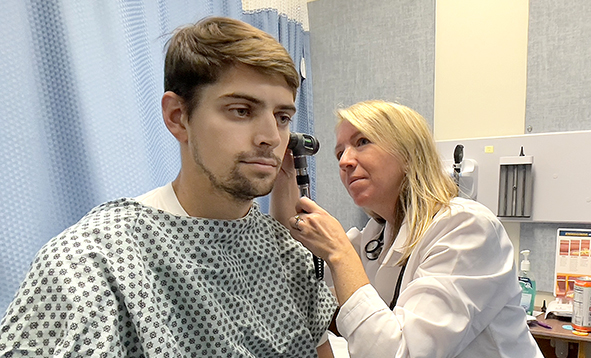
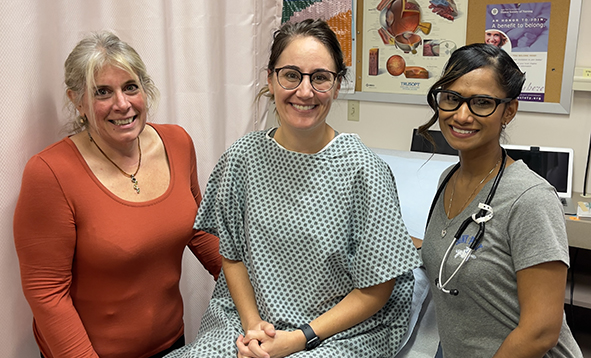
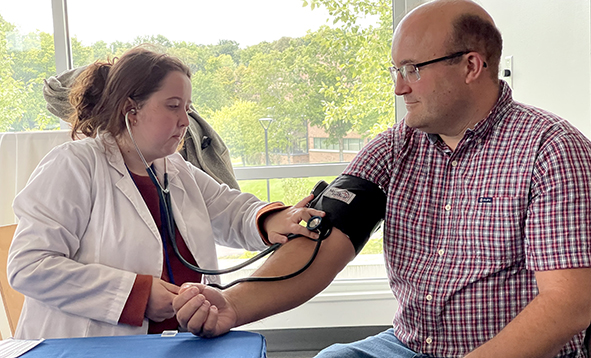
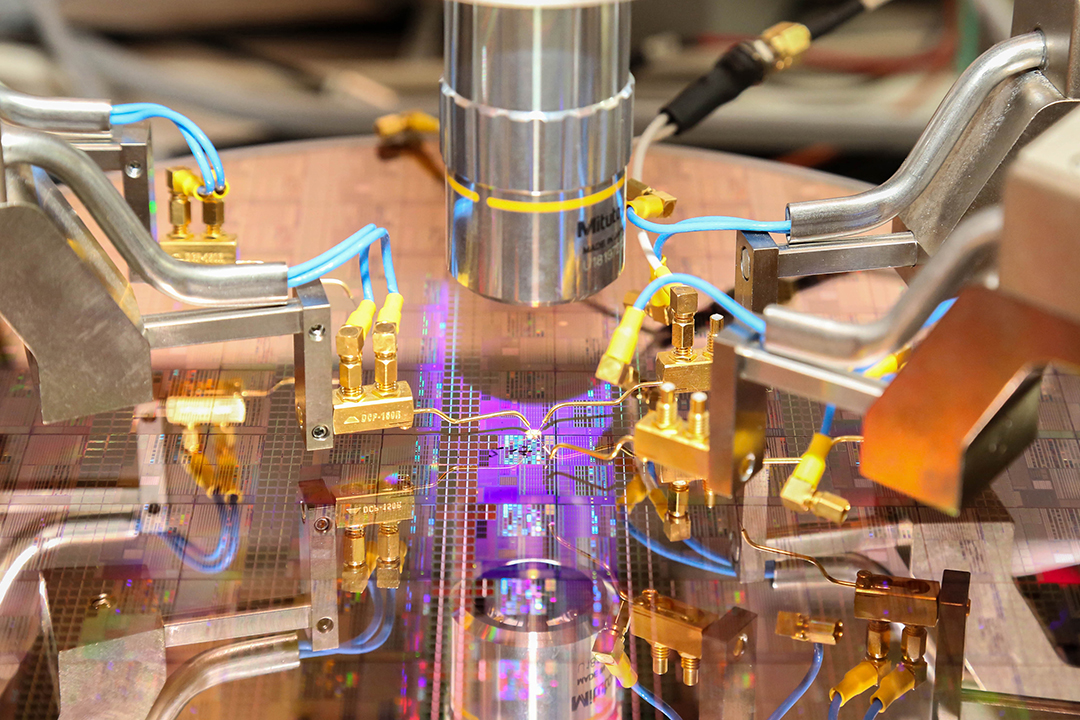
College of Nanoscale Science + Engineering

$5.5 Million from Air Force Research Laboratory for Smaller, More Efficient Computer Chips That Can Learn and Adapt
Empire Innovation Professor of Nanobioscience Dr. Nathaniel Cady was awarded $5,500,000 in funding from the Rome-based Air Force Research Laboratory to demonstrate adaptable and reconfigurable neural networks, computing systems that act like synapses in the human brain. This will allow Dr. Cady, with SUNY Poly adjunct faculty member Dr. Karsten Beckmann and their research team to fabricate small, low-power neuromorphic computer chips.
Nearly $700,000 in First Round Funding to Contribute to the Development of Next-Gen Night Vision Systems
Professor of Nanoscale Engineering Dr. Shadi Shahedipour-Sandvik has received $699,000 from Defense Advanced Research Projects Agency (DARPA) as part of a research effort lead by SRI International and in collaboration with Vanderbilt University. With two phases of the Enhanced Night Vision in Eyeglass Form (“ENVision”) project, if a second phase is funded, SUNY Poly anticipates receiving a total $1.4 million in funding as part of the overall $6 million initiative, which seeks to address challenges with current night vision (NV) systems that limit the wearer’s agility and comfort. SUNY Poly researchers will focus on developing image intensifier components, which will reduce the size and weight of an NV system, and therefore the strain on their user.
National Science Foundation Awards SUNY Poly Research Team $500,000 for Development of Biocompatible Electronic and Photonic Devices
A team of professors is receiving $500,000 in new funding from the National Science Foundation (NSF) to facilitate development of new manufacturing methods to enable next-generation bioelectrical and biophotonic devices that can interface with living tissues. This could help enable information, such as brain electrical signals or muscle stimulation, to be transferred between such devices and the living system to improve quality of life. Led by Professor of Nanobioscience Dr. Susan Sharfstein with Professor of Nanoscale Science Dr. Robert Geer; Empire Innovation Professor of Nanobioscience Dr. Nate Cady, and Professor of Nanobioscience Dr. Yubing Xie, as well as Development Integration Engineer Dr. Nicholas Fahrenkopf, the award will also lead to a series of related workshops with a wide range of academic and industrial partners to identify additional research and manufacturing issues that can be further addressed.
$440,000 in Funding from the National Science Foundation for Next-Gen Quantum Research
Associate Professor at CNSE Dr. Spyros Gallis (Spyridon Galis) has received $440,000 from the National Science Foundation as part of a collaborative cross-institutional research team led by the University of Rochester’s Institute of Optics, which is focused on processing quantum information as carried by photons, or particles of light. Read more about this research effort.
$300,000 in Funding from U.S. Department of Energy for Ultrafast Scintillation Detectors
Professor of Nanoscience Dr. Serge Oktyabrsky received $300,000 in funding from the U.S. Department of Energy to further develop state-of-the-art scintillating detectors, which, upon the detection of fast, charged particles, or X-ray photons, emit measurable light, resulting in the fastest high-yield scintillating materials reported so far. By being able to detect particles faster, they can be used for high-energy physics applications and can be essential for a range of critical medical imaging and nuclear security-focused applications
Research Team Awarded $270K from the Semiconductor Research Corporation to Optimize Computer Chip Production Processes
SUNY Poly received an award from the Semiconductor Research Corporation (SRC) Nanomanufacturing Materials and Processes (NMP) to fund research led by SUNY Poly TEL Innovation Scientist Dr. Christophe Vallée, with Associate Professor of Nanoengineering Dr. Gregory Denbeaux, along with several students, who plan to detail a more time and cost effective process for the computer chip deposition process, in which material will be selectively deposited in the most optimized manner during the photolithography process, used to create computer chips layer by layer. Selective deposition can help address uniformity concerns as computer chips shrink in size to increase their performance.
Prof. Sharfstein Awarded $125,000 from The National Institute for Innovation in Manufacturing Biopharmaceuticals for Development of Bioreactor to Culture Immune Cells
The funding from The National Institute for Innovation in Manufacturing Biopharmaceuticals (NIIMBL), supports a novel, wicking matrix bioreactor (WMB) for automated expansion and recovery of hematopoietic cells for therapeutic applications, including immuno-oncology, which seeks to use immune cells to target cancers.
Business Accelerator ‘Hyperspace Challenge’ Announces SUNY Poly Team Wins 2nd Place
Hyperspace Challenge, a business accelerator run by the Air Force Research Laboratory and CNM Ingenuity as part of the U.S. Space Force’s new SpaceWERX program, announced the six winners of its 2021 cohort. The team from SUNY Poly’s Albany campus builds computer brains with a ReRAM Memristor synapse technology created to handle and process information that will assist in the automation of on-orbit servicing, assembly, and manufacturing. These light-weight and radiation hard neural networks will contribute to sustainability in the space ecosystem as well as reduce potential satellite debris.
Collaborative research defines how acetaminophen can impact gene regulation
Interim Dean of the College of Nanoscale Science and Engineering Dr. André Melendez and SUNY Poly Ph.D. graduate Sara Evke published collaborative research with the laboratory of Dr. Tom Begley of the University at Albany, “Epitranscriptomic Reprogramming Is Required to Prevent Stress and Damage from Acetaminophen,” in Genes. Read more about their findings.
Senior Justin Nhan Receives Prestigious SUNY ACT for Excellence and Student Initiative Scholarship
Senior Justin Nhan received the SUNY ACT for Excellence and Student Initiative Scholarship, which recognizes only five top students annually from across SUNY’s campuses for their academic performance and dedication to their campus or community. Justin, whose academic career has been a testament to the unique academic and hands-on research opportunities available to students at SUNY Poly, will receive $1,000 and an additional $250 will be provided in his name to the charity of his choice.
In addition, Justin received the SPIE 2021 Jeffrey Byers Memorial Best Poster Paper Award.
WTEN Shared How ‘SUNY Poly Trains Bright Young Minds to Work at Every Level of Computer Chip Development’
WTEN shared the story of CNSE senior Justin Nhan: “He…chose to attend SUNY Poly because of the intensely close partnerships with semiconductor fabrication industry leaders like Wolfspeed, IBM, AMAT, and TEL Technology America. Internships coordinated through the school allow the students to work on company projects and real developments in clean rooms on campus. Nhan himself worked on IBM’s development of a groundbreaking computer chip that despite being only about the size of a fingernail, contains 50 billion transistors and has components that are only two nanometers in size.”
Biofabrication publishes collaborative research by SUNY Poly Graduate Student Pujhitha Ramesh
Biofabrication published, “Engineering cryoelectrospun elastin-alginate scaffolds to serve as stromal extracellular matrices,” collaborative research by SUNY Poly Graduate Student Pujhitha Ramesh. The research was undertaken with SUNY Poly professors Susan Sharfstein and Yubing Xie, in partnership with Professor Melinda Larsen from the University at Albany and Professor Kristen Mills from Rensselaer Polytechnic Institute (RPI).
Chancellor Announces the Winners of the Inaugural Chancellor Distinguished PhD Graduate Dissertation Awards
SUNY Poly finalist Zachary Olmsted was among four from SUNY institutions receiving $1,000 for his dissertation, “Human Trunk Development and Innervation in a Dish to Facilitate Neurotherapeutics.”
American Pharmaceutical Review publishes collaborative research by SUNY Poly’s Dr. Susan Sharfstein
Drs. Susan Sharfstein and Scott Tenenbaum featured in Immuno-Oncology Insights
Prof. Unni Pillai featured in Vox, ‘The neon shortage is a bad sign’
Professor Nathaniel Cady’s joint COVID-19 research featured in Optics.org
Science Signaling publishes collaborative research by SUNY Poly Professor Ben Boivin
SUNY Poly CNSE and NIOSH publish findings assessing nanomaterial health and safety practices
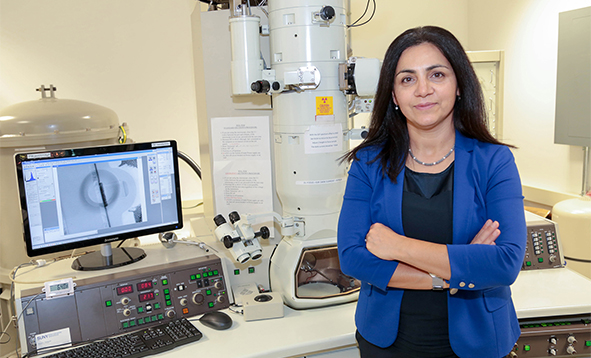
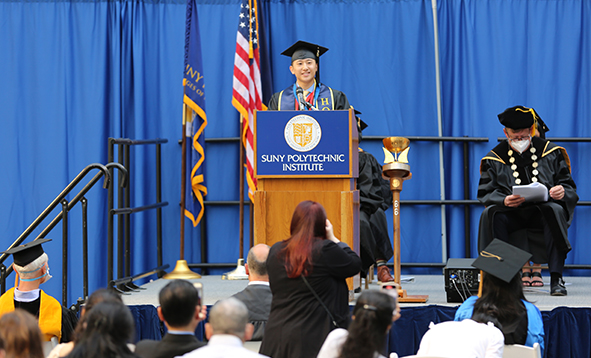
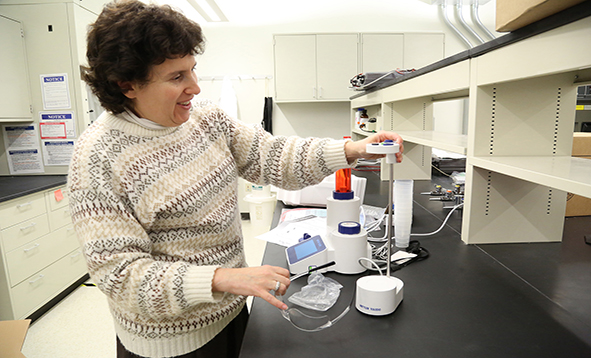
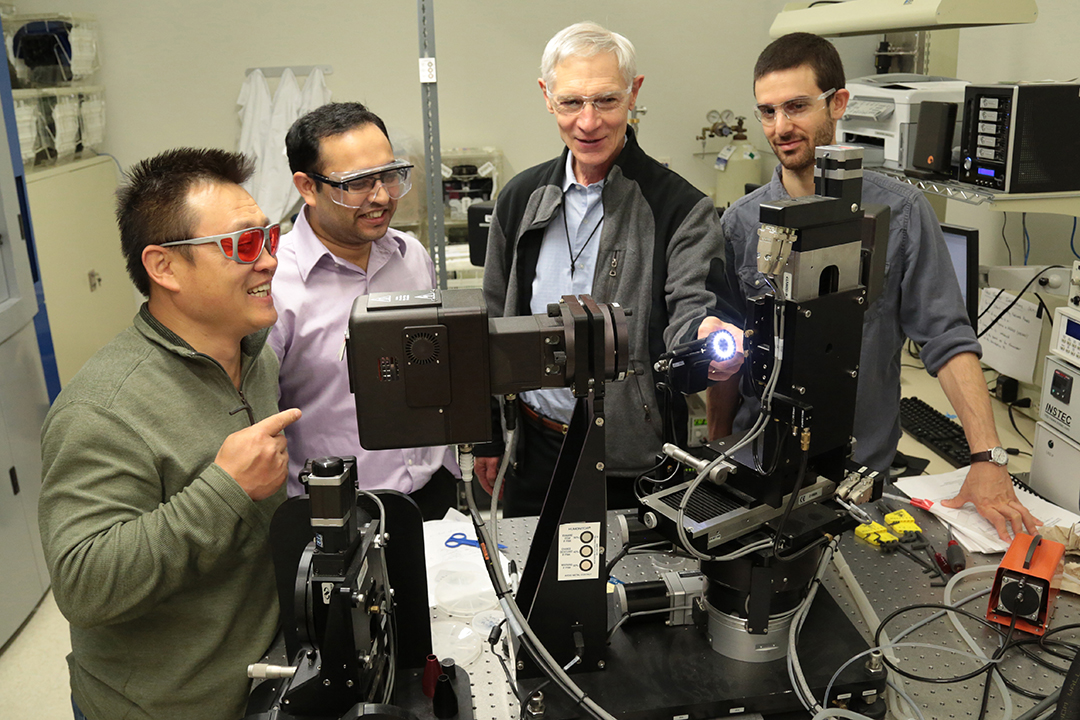
Office of Research + Graduate Studies

SUNY Poly Spinoff NoMIS Power Group Looking to Provide SiC Power Semiconductor Devices and Modules to More Companies
NoMIS Power Group began from a research effort started in September 2019, when postdoc Dr. Adam Morgan connected with Associate Professor of Nanoengineering Dr. Woongje Sung and his students to help them further evaluate their silicon carbide (SiC) power semiconductor devices beyond on-wafer measurements. Since then, the Albany Business Review has reported on NoMIS’ latest successful efforts. Also, read the full NoMIS Power Group profile.
Albany Business Review highlights SUNY Poly student startup
“(Ellen) Conti and the other co-founders, Ed McDermid and Rachel Cook, came up with the idea in an entrepreneurship class they were taking together as part of the MBA program at SUNY Poly. McDermid has a background in software development, and Cook has a background that includes game design.” Their idea? A next-generation “inspection safety helmet that could save manufacturing companies hundreds of thousands of dollars.” Read the Albany Business Review’s coverage.
Video: ‘This is Why’: Emma Rocco, PhD Research Assistant Shares Why She Chose STEM and SUNY Poly
On International Day of Women and Girls in Science, the NYS Department of Labor celebrated the scientists who are helping to close the STEM gender gap. They chose to share the story of scientists like Emma Rocco, a research assistant at SUNY Poly, who is on the path to becoming a professor to inspire the next generation of scientists. Read more and watch the video.
SUNY Poly Announces Inaugural CENN Fellowship Recipient
The Office of Research and Graduate Studies was pleased to announce Ph.D. candidate Rubab Ume as the Inaugural recipient of the New York State Center of Excellence in Nanoelectronics and Nanotechnology (CENN) Fellowship. The CENN is funded by the NYSTAR Division of Empire State Development and is hosted at SUNY Poly’s College of Nanoscale Science and Engineering.
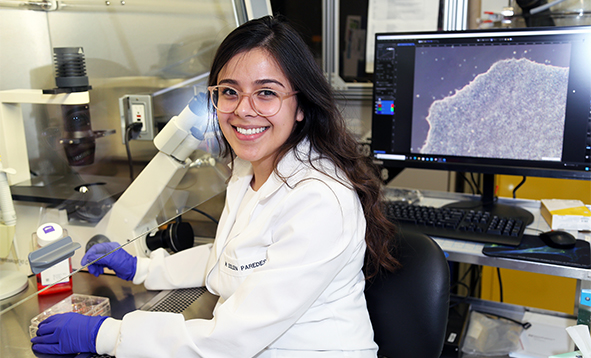
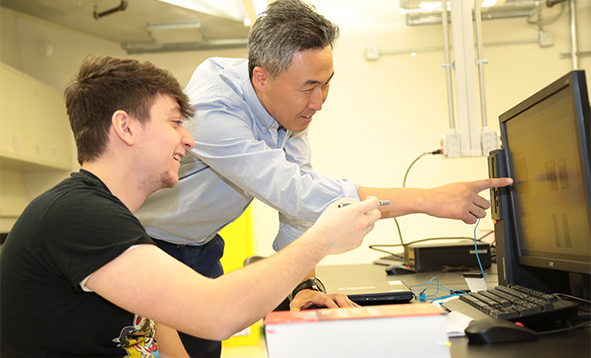
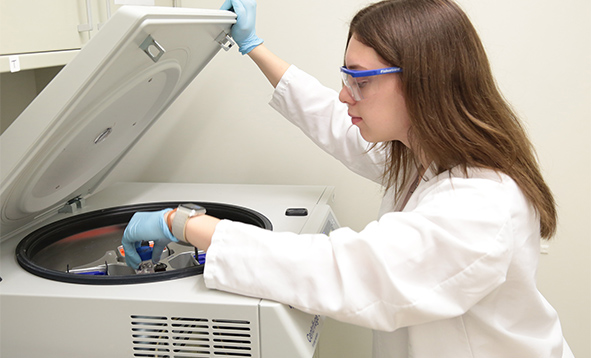
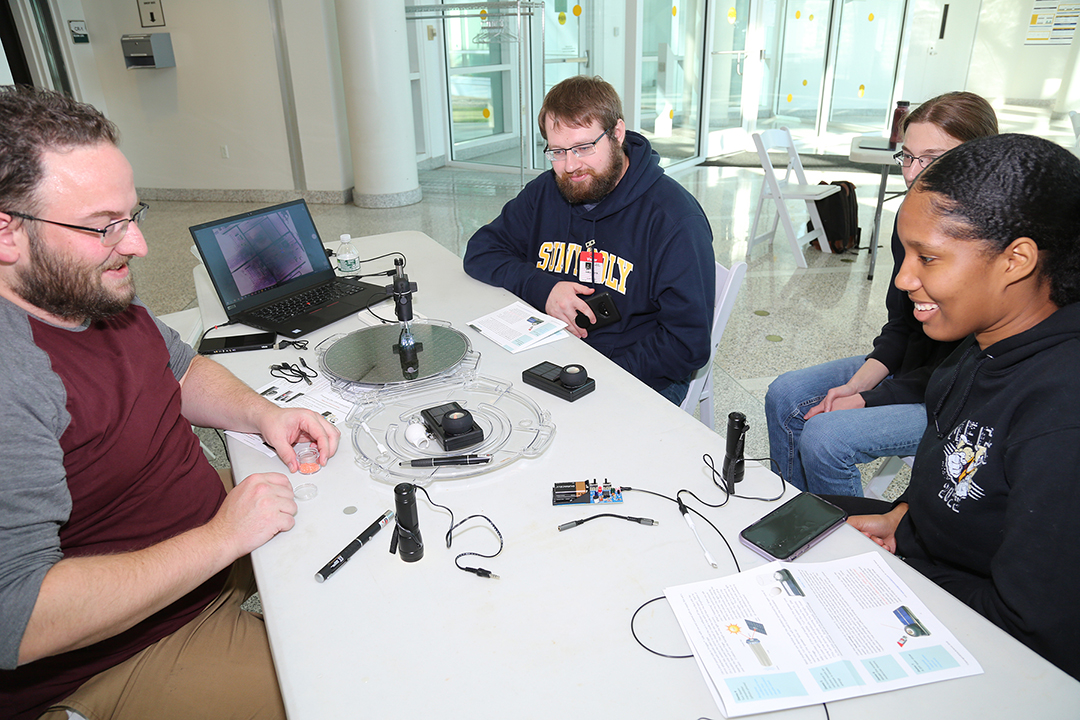
Highlights

SUNY Polytechnic Institute enrolled 3,439 unduplicated students in the 2021-2022 academic year. About three-quarters of these students were undergraduates, and approximately 40% were female. The overwhelming majority of SUNY Poly’s students were from New York State—94%. Five percent of SUNY Poly’s students overall were international students, and 1% were from out of state.
In 2021-2022, SUNY Poly students were enrolled in 50 different programs. The most popular major areas among undergraduates were Engineering & Engineering Technology, Computer Science, Business, and Health Sciences, in addition to Interactive Media & Game Design. Our graduate programs include Ph.D. programs Nanobioscience, Nanoscale Science, Medicine & Nanoscale Science, Medicine & Nanoscale Engineering, and Nanoscale Engineering, an MBA program in Technology Management, and MS programs in Accountancy, Computer Information Science, Health Informatics, Information Design & Technology, Cybersecurity, Family Nurse Practitioner, Nursing Education, and Psychiatric Mental Health Nurse Practitioner DNP.
Included in the fall 2020 student population for which the latest statistics are available, there were 603 new full-time undergraduate students (out of 351 first-year and 252 transfers) who started their academic careers at SUNY Poly. They had an 75.3% and 76% first-year retention rate, respectively. SUNY Poly graduated 724 students in the 2021-2022 reporting year, including 265 from the College of Engineering, 103 from the College of Arts & Sciences, 169 from the College of Business, 158 from the College of Health Sciences, and 29 from the College of Nanoscale Science and Engineering. Among these undergraduate graduates, their average time to degree completion was 4.08 years for first-year, and 3.26 years for full-time and part-time transfers.
Student Scholarships and Other Awards
A significant number of our undergraduate students receive financial aid:
38
Percent of our undergraduates who receive Pell
